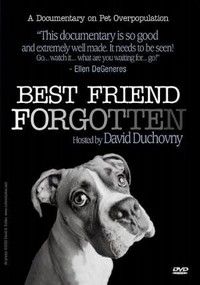Best Friend Forgotten
| Best Friend Forgotten | |
|---|---|
 | |
| Directed by | Julie Lofton |
| Written by | Julie Lofton |
| Produced by | Julie Lofton |
| Starring | David Duchovny Clover, the Dog Oreo, the Cat |
| Narrated by | David Duchovny |
| Cinematography | Stephen Lighthill Keith Walker J.B Letchinger |
| Edited by | Jan Sutcliff |
| Music by | Matt Mariano |
| Distributed by | PBS |
Release date |
|
Running time | 100 minutes |
| Country | United States |
| Language | English |
Best Friend Forgotten is a 2004 American documentary film about pet overpopulation. The documentary, hosted by David Duchovny (Californication, X-files), tells the stories of Oreo the cat and Clover the dog as they face the realities of pet overpopulation. Viewers are given a balanced look at the controversial practice of euthanasia and the alternative no-kill movement. Interviews discuss common myths about spaying and neutering, and leaders from government to animal rights groups discuss pet overpopulation and the impact on our society.
Creators
[edit]The documentary was written, directed, and produced by filmmaker Julie Lofton. In addition to a US theatrical run, the film aired nationally on PBS, was shown worldwide on TV, and is available in DVD. In 2005 Lofton won the prestigious Genesis Award for Best National PBS Documentary from the Humane Society of the United States, the largest animal protection organization in the US.
Following the film, Lofton was recruited by HSUS to spearhead the creation of their first TV/Film division: Animal Content in Entertainment (ACE), whose mission is to develop and support animal content in television and film. Each year ACE awards production grants to professional and student documentary filmmakers who highlight animal rights issues in short and feature-length films.[1][2]
References
[edit]- ^ "SILVERDOCS International Documentary Conference". American Film Institute, 2006. Archived from the original on 2011-02-14.
- ^ "HSUS's Animal Content in Entertainment (ACE) program supports animal protection issues in entertainment media". HSUS, October 9, 2009. Archived from the original on March 31, 2010.
External links
[edit]- Best Friend Forgotten at IMDb
- Best Friend Forgotten, HSUS feature article
- David Duchovny Hosts New Film About Abandoned Pets O'Bryanville Animal Rescue
- "The Woman Behind the Camera" (PDF). Animal Sheltering Magazine. 2004. Archived from the original (PDF) on 2010-11-30.
- "Filmmaker Asks:"Do You Know What Pet Overpopulation Is?"" (PDF). Animal Sheltering Magazine. 2003. Archived from the original (PDF) on 2010-11-30.
- 2004 films
- American documentary films
- Documentary films about animal rights
- 2004 documentary films
- Documentary films about dogs
- Pets in the United States
- Films about pets
- 2000s English-language films
- 2000s American films
- Documentary films about cats
- English-language documentary films
- Nature documentary film stubs
